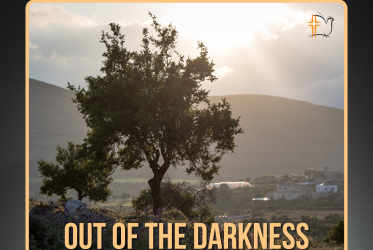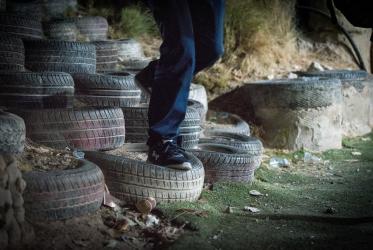Israel und Palästina
Israel and Palestine or the OPT - Occupied Palestinian Territories (West Bank, with East Jerusalem, and Gaza) - are located along the Mediterranean Sea between Egypt in the south, Lebanon to the north and Jordan to the east.
From the nineteenth century, the Zionist movement dedicated itself to the creation of a Jewish state and the physical return of Jews to Palestine. Given impetus by the Holocaust in Europe and increasing immigration (legal and illegal) of Jews into Palestine, the state of Israel came into being in 1948, after the British surrendered their mandate over Palestine. Most Palestinians rejected this arrangement and the majority of the population - some 750,000 Palestinians - fled or were expelled. In 1967, Israel occupied the West Bank, including East Jerusalem, and Gaza, causing further waves of refugees. There are now some 4 million Palestinian refugees scattered throughout the Middle East and Palestine, many living in permanent refugee camps. Since 1967 Israel has remained in military occupation of the OPT - both the West Bank and Gaza. Israel and its Occupation of the Palestinian Territories has been a focus of the international community and the international church community for decades.
In Israel and Palestine the number of Christians is declining, mainly due to emigration. Some are concerned that this "holy land" - including such historic Christian towns as Jerusalem and nearby Bethlehem - will become bereft of Christian "living stones" and serve as only a museum for international pilgrims.
Palestinian Christians may be small in number, but they are very active and visible in public life. In Israel, they are concentrated in the Galilee in northern Israel and around Jaffa and Lod in central Israel. In the Occupied Palestinian Territories, Christian communities are predominantly in the regions of Jerusalem, Bethlehem and Ramallah, with smaller numbers in other towns and a very small number in Gaza. They worship in a rich variety of church traditions: Eastern and Oriental Orthodox, Catholics and Protestants.
The Jerusalem Interchurch Centre (JIC), a joint venture between the World Council of Churches (WCC), the Middle East Council of Churches (MECC) and the local churches functions as a coordination point for ecumenical action in and for Jerusalem and its churches. JIC offers information, analysis and reports to the ecumenical community, and works to strengthen local churches' capacity for diaconal work as well as local ecumenical and inter-faith relations.
As well as worshipping together Sunday by Sunday, the Christian communities reach out to the society through offering educational opportunities, clinics, refugee support, social services and reconciliation projects. The mainline churches are members of the Middle East Council of Churches, which is also active in diaconal projects in the West Bank and Gaza. The Heads of Churches from the main traditions meet regularly to offer leadership to the Christian community. Christians are in need of encouragement and assurance as they maintain a Christian presence in the land in which Jesus lived.
The Palestine Israel Ecumenical Forum (PIEF) was launched by WCC in 2007 to "catalyze and co-ordinate new and existing church advocacy for peace, aimed at ending the illegal occupation (of Palestinian territories) in accordance with UN resolutions, and demonstrate its commitment to inter-religious action for peace and to justice that serves all peoples of the region."
Inaugurated in August 2002, the Ecumenical Accompaniment Programme in Palestine and Israel (EAPPI) seeks to support local and international efforts to end the Israeli occupation and bring a resolution to the Israeli-Palestinian conflict with a just peace, based on international law and relevant United Nations resolutions.
More on Israel and Palestine:
Living Letters solidarity visit to Israel and Palestine
A team of ecumenical representatives from around the world visited churches, ecumenical organizations and civil society movements in Israel and Palestine from 7 to 14 March 2009. The visit focused on peace-building initiatives, housing and education issues. Read more...





